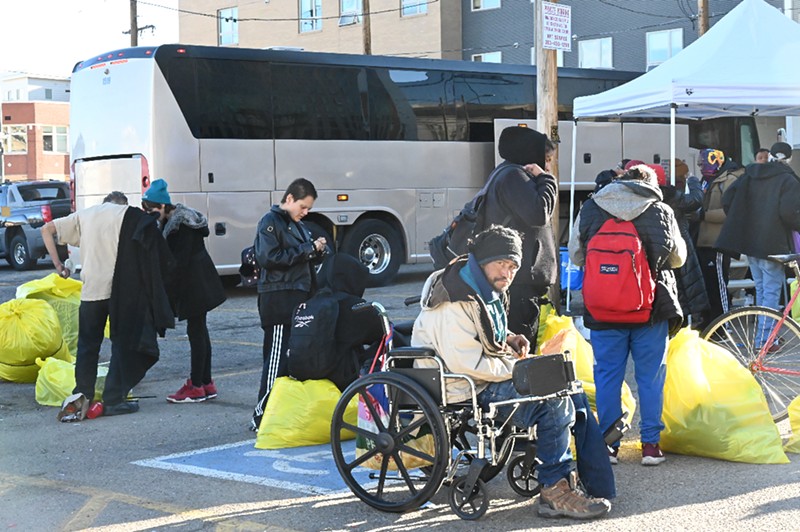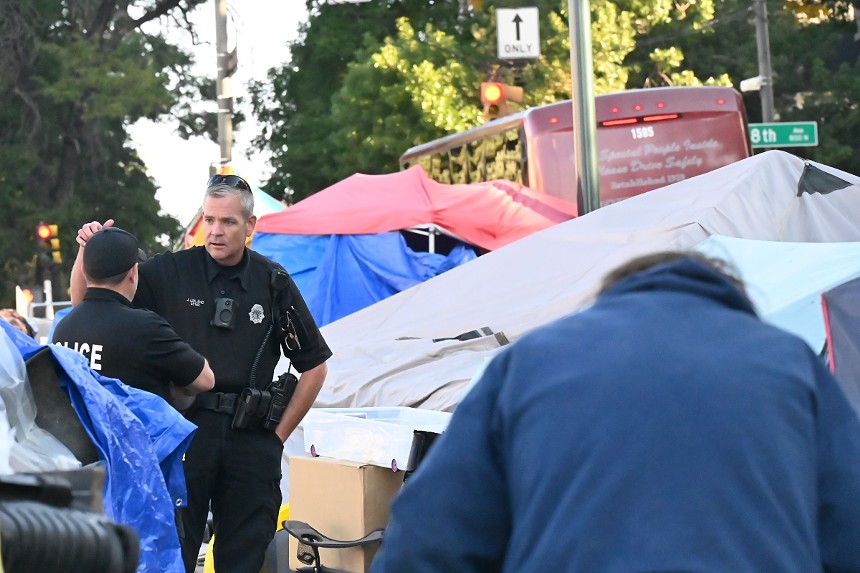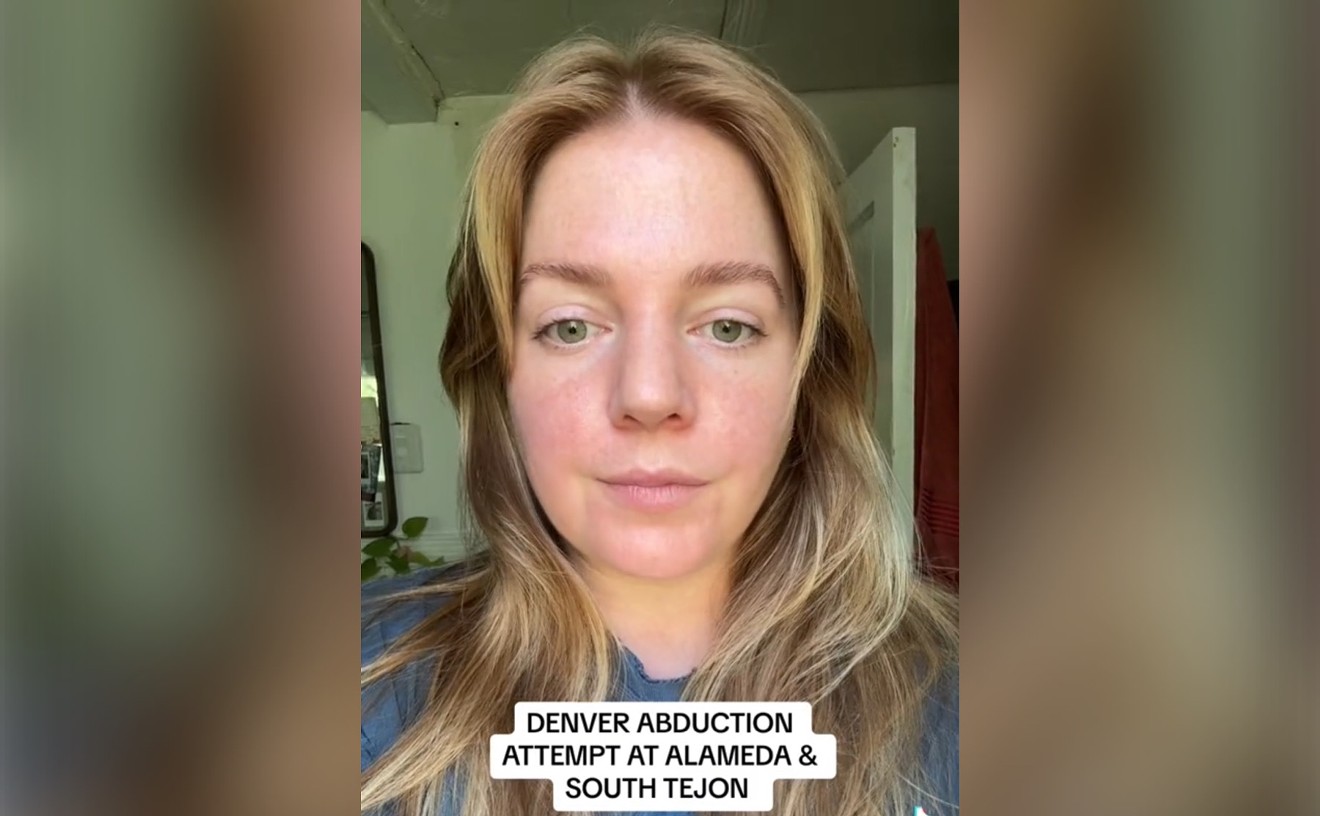During his first five-plus months in office, Mayor Mike Johnston had an ambitious goal: to move 1,000 people off the streets and into housing by the end of 2023. In the process, he also changed the definition of sweeps.
"We want to introduce a new term to the vocabulary in Denver," Johnston said during a December 7 press conference before a street was cleared. "This is a 'resolution' of an encampment, or sometimes we call it a closure. Before, the sweep was a move to nowhere. This is a resolution to move folks into housing."
That announcement came just before the city's largest sweep — make that encampment resolution — which moved 117 people off the street and into housing. It took the city over a quarter of the way to meeting the goal of House1000, and subsequent actions pushed the number housed to close to a thousand.
As of December 29, the mayor's progress meter on the House1000 online dashboard said that Johnston's administration had moved 932 people indoors. Of that total, 633 had been swept indoors through eight homeless encampment resolutions. They are:
September 25: East Eighth Avenue and Logan Street (by the Governor's Mansion) — 83 people moved indoors
September 25: East Eighth Avenue and Logan Street (by the Governor's Mansion) — 83 people moved indoors
October 31: 21st and Curtis streets — 61 people moved indoors
November 16: 24th and Arapahoe streets — 21 people moved indoors
December 7: 22nd and Curtis streets — 117 people moved indoors
December 12: East 48th Avenue and Colorado Boulevard — 102 people moved indoors
December 19: 20th and Champa streets — 92 people moved indoors
December 20: 22nd and Stout streets — 93 people moved indoors
December 21: East 18th Avenue and Marion Street — 64 people moved indoors
But a substantial number of individuals were moved through other means. "More than 200 people have been offered indoor shelter and wraparound services through other efforts," including the Denver Street Outreach Collaborative and the Department of Housing Stability, according to Jose Salas, the mayor's deputy director of communications.
Two more sweeps are planned for the last weekend of December, which will bring Johnston's total number of encampment resolutions for 2023 up to ten, says Salas.
The mayor's office reports that the encampment resolutions "permanently closed eight of Denver's largest encampments." Two of them were carried out in the same spot, however: along Curtis Street by the U.S. Post Office at 951 20th Street. Ultimately, about 270 people were moved indoors from that encampment.
Five of the eight encampment resolutions so far happened in December, as Johnston picked up the pace.
Not everyone who was moved by an encampment resolution got housing, however. During the first resolution, outside the Governor's Mansion, some encampment residents reported being skipped over for housing.
And the Johnston administration also swept a few encampments before it had housing units available.
Early in his administration, Johnston said that he would only sweep an encampment if he had someplace to put its occupants. The exceptions, he added, would be if an encampment created public health or safety concerns or if it violated right-of-way rules.
The first sweep of the Johnston administration was on August 4, at 22nd and Stout streets, where a few dozen people were moved because the encampment had rats. The city returned to the area more than four months later to offer housing through an encampment resolution.
The second sweep, on August 21, occurred on the 1700 block of Logan Street. An encampment with upwards of fifty people was moved because gunshots had been fired there, though residents noted that they weren't fired by anyone who lived there.
Enforcement of right-of-way rules led to more sweeps. In October, these rules were used to clear large encampments — especially after the Triangle Bar cited homelessness as the reason it closed and other businesses in the area said they feared a similar fate.
The Denver Police Department also used what are called "soft enforcement operations," or soft sweeps, to move encampments. The officers would show up to tell people they were violating Denver's camping ban but didn't issue citations or make arrests.
By mid-December, Johnston was finally able to secure 1,100 units at hotels converted into non-congregate shelters, which allowed him to speed up the rate of encampment resolutions. Six hotels are now being used to temporarily house the approximately 1,000 people that Johnston took off the streets.
The hotels are key, since the ten micro-communities planned back in August to house the homeless have been whittled down to four by neighborhood pushback. The city will start moving people into the first official micro-community, at 12033 East 38th Avenue, on Sunday, December 31.
Johnston says he already feels like he's clinched the House1000 goal heading into the weekend. In a statement, he says he considers it a "big win" for Denver.
“By providing stable housing and closing encampments, we are transforming the lives of our neighbors and revitalizing the core of our neighborhoods," Johnston says in a statement. "This milestone is a huge win for the people of Denver and represents crucial progress toward our goal to bring 1,000 people indoors before the end of the year.”













